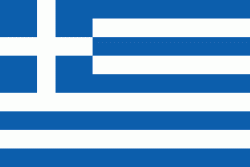Poros (Póros)
Poros (Πόρος) is a picturesque small town located in the municipal unit of Eleios-Pronnoi, some 40 km SE of Argostoli, 28 km SE of Sami and 12 km NE of Skala, in the southeast of Cephalonia, one of the Ionian Islands of Greece.
The community of Poros consists of the villages:
* Poros, pop. 930
* Asprogerakas, pop. 12
* Kampitsata, pop. 41
* Riza, pop. 34
* Tzanata, pop. 159
Poros is effectively divided into three parts. Poros port, with its couple of tavernas and bars, connects the island with Kyllini on the Peloponnese area of mainland Greece via regular year-round ferry service. During the summer months a ferry may connect Poros with Zakynthos and a couple of tourist caiques offer cruises to Ithaca and the Blue Caves of Zakynthos. The harbour is also home to the local fishing boats which supply the area with fresh fish.
Separated from Poros port by a small hillock lies the shingle town beach, backed by a taverna-fringed square and main services: bank, chemist (pharmacy), doctor's surgery, post office, police station and local shops. More tavernas and bars lie along the award-winning 'Blue Flag' beach, Aragia, separated from the centre of Poros by the Vohinas river which, although used as a car park in summer, can be a raging torrent in winter.
The Vohinas almost certainly gave Poros its name. The word ‘poros’ in Greek means ‘ford’ or ‘crossing’ and where the Vohinas enters the sea is the only natural crossing point, although two bridges now cross the river further upstream where the Vohinas exits the impressive Poros gorge, an 80-metre deep rugged ravine which, until a road was cut through to Skala around 1996, was the only land route out of Poros. Local legend has it that the gorge was ‘cut’ by Heracles when he stood on, and flattened, this part of the mountain.
The community of Poros consists of the villages:
* Poros, pop. 930
* Asprogerakas, pop. 12
* Kampitsata, pop. 41
* Riza, pop. 34
* Tzanata, pop. 159
Poros is effectively divided into three parts. Poros port, with its couple of tavernas and bars, connects the island with Kyllini on the Peloponnese area of mainland Greece via regular year-round ferry service. During the summer months a ferry may connect Poros with Zakynthos and a couple of tourist caiques offer cruises to Ithaca and the Blue Caves of Zakynthos. The harbour is also home to the local fishing boats which supply the area with fresh fish.
Separated from Poros port by a small hillock lies the shingle town beach, backed by a taverna-fringed square and main services: bank, chemist (pharmacy), doctor's surgery, post office, police station and local shops. More tavernas and bars lie along the award-winning 'Blue Flag' beach, Aragia, separated from the centre of Poros by the Vohinas river which, although used as a car park in summer, can be a raging torrent in winter.
The Vohinas almost certainly gave Poros its name. The word ‘poros’ in Greek means ‘ford’ or ‘crossing’ and where the Vohinas enters the sea is the only natural crossing point, although two bridges now cross the river further upstream where the Vohinas exits the impressive Poros gorge, an 80-metre deep rugged ravine which, until a road was cut through to Skala around 1996, was the only land route out of Poros. Local legend has it that the gorge was ‘cut’ by Heracles when he stood on, and flattened, this part of the mountain.
Map - Poros (Póros)
Map
Country - Greece
 |
 |
| Flag of Greece | |
Greece is considered the cradle of Western civilization, being the birthplace of democracy, Western philosophy, Western literature, historiography, political science, major scientific and mathematical principles, theatre and the Olympic Games. From the eighth century BC, the Greeks were organised into various independent city-states, known as poleis (singular polis), which spanned the Mediterranean and the Black Sea. Philip II of Macedon united most of present-day Greece in the fourth century BC, with his son Alexander the Great rapidly conquering much of the ancient world, from the eastern Mediterranean to the North Western parts of India. The subsequent Hellenistic period saw the height of Greek culture and influence in antiquity. Greece was annexed by Rome in the second century BC, becoming an integral part of the Roman Empire and its continuation, the Byzantine Empire, which was culturally and linguistically predominantly Greek.
Currency / Language
| ISO | Currency | Symbol | Significant figures |
|---|---|---|---|
| EUR | Euro | € | 2 |
| ISO | Language |
|---|---|
| EN | English language |
| FR | French language |
| EL | Greek language |















